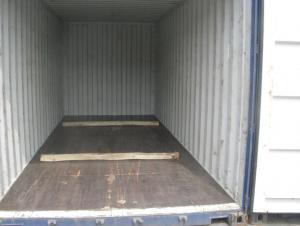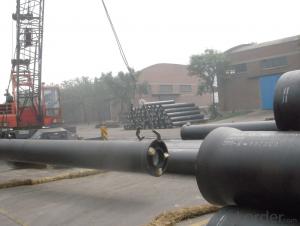DUCTILE IRON PIPES AND PIPE FITTINGS k8 CLASS DN1500
- Loading Port:
- Tianjin
- Payment Terms:
- TT OR LC
- Min Order Qty:
- 22 pc
- Supply Capability:
- 3000 pc/month
OKorder Service Pledge
OKorder Financial Service
You Might Also Like
Material : Ductile Cast Iron
Size Range : DN 80mm to DN 2000mm
Unit Effective Length : 6m or 5.7m
Manufacture Standard: ISO 2531:1998/ EN 545:2006/EN 598:2007
Annual capacity : 200,000 tons
Coating Exterior: Zinc 130g/m2 according to ISO 8179-1 and bitumen coating 70 microns.
Cement Interior: Portland Cement/ High Alumina Cement/ Sulphate Resisting Cement Lining according to ISO 4179
Special requirements on external coating and internal lining can be applied
We also provide accessories such as SBR/EPDM rubber gaskets, lubricant paste, pipe caps, PE sleeves, etc.
Additional Parts:
Each pipe is strictly inspected according to related standard to ensure permanently high performance.
Easy Installation at site and service free for life
Long Service Lifespan
Quotation will arrive you within 24hours once we get your inquiry.
We guarantee offering you a competitive price.
A copy of original inspection reports of pipes will be offered after shipment.
Photos of loading process will be sent to the customer after shipment effect.
We will follow-up the delivery progress after shipment effect and update to the customer on weekly basis.
- Q:Are ductile iron pipes resistant to chemicals?
- Yes, ductile iron pipes are highly resistant to a wide range of chemicals, making them suitable for various applications involving corrosive substances.
- Q:How are ductile iron pipes protected from external damage?
- Ductile iron pipes are protected from external damage through the application of protective coatings. These coatings act as a barrier, shielding the pipes from corrosion and other forms of external damage. Additionally, the pipes may be encased in concrete or installed in a casing pipe to provide further protection against external forces and impacts.
- Q:Can ductile iron pipe be used for wastewater treatment plant sludge handling?
- Indeed, ductile iron pipe is suitable for the handling of sludge in wastewater treatment plants. Possessing strength and durability, this material resists corrosion and endures the challenging conditions related to sludge management. Frequently employed in wastewater treatment plants for sludge transport, it ensures remarkable structural integrity and boasts an extended lifespan. Moreover, ductile iron pipe proves effortless to install and maintain, rendering it a pragmatic selection for sludge handling purposes within wastewater treatment plants.
- Q:What is the relationship between the direction of the spigot and the direction of the flow in the ductile iron pipe?
- Called "ductile" (Ductile Cast Iron Pipes), referred to as ball pipe, ductile iron pipe and ductile iron pipe etc..
- Q:Can ductile iron pipes be used for underground fuel storage systems?
- Underground fuel storage systems can utilize ductile iron pipes, which offer superior strength, durability, and flexibility compared to traditional cast iron pipes. These properties render ductile iron pipes suitable for a range of applications, including underground fuel storage. An important advantage of ductile iron pipes is their resistance to corrosion, a crucial factor for underground storage systems that may encounter various fuels and chemicals. Furthermore, their high tensile strength and resilience enable them to withstand external pressure and loading, ensuring the integrity and safety of the underground storage system. Additionally, ductile iron pipes boast a long lifespan, typically lasting for several decades. This longevity makes them a cost-effective option for underground fuel storage systems, as they can bear the weight of stored fuel and potential ground movements while maintaining the structural integrity of the system over time. Nevertheless, it is worth noting that the appropriateness of ductile iron pipes for underground fuel storage systems may depend on other factors, such as local regulations, soil conditions, and the specific fuel being stored. To ensure compliance and safety, it is always advisable to seek guidance from professionals and adhere to relevant guidelines when designing and installing such systems.
- Q:Are ductile iron pipes suitable for use in oil refineries?
- Yes, ductile iron pipes are suitable for use in oil refineries. Ductile iron is a type of cast iron that offers a unique combination of strength, durability, and flexibility, making it an excellent choice for various applications, including oil refineries. One of the key advantages of ductile iron pipes is their high tensile strength, allowing them to withstand the high pressure and stress commonly found in oil refining processes. This strength is crucial for the transportation of various fluids, including crude oil, refined petroleum products, and chemicals within the refinery. Additionally, ductile iron pipes have excellent corrosion resistance properties, making them highly resistant to the corrosive effects of oil, chemicals, and other substances typically present in oil refineries. This corrosion resistance ensures the longevity and reliability of the pipes, reducing the need for frequent maintenance and replacement. Furthermore, ductile iron pipes have exceptional ductility, which means they can absorb and withstand significant impacts and vibrations without fracturing or breaking. This quality is advantageous in oil refineries where there may be frequent movement or potential stressors due to machinery, equipment, or ground settlement. Moreover, ductile iron pipes have a smooth interior surface that reduces friction, allowing for efficient fluid flow and minimizing pressure loss. This characteristic is essential in oil refineries, as it helps optimize the transportation of fluids, ensuring a smooth and reliable production process. In conclusion, ductile iron pipes are suitable for use in oil refineries due to their high tensile strength, corrosion resistance, ductility, and smooth interior surface. These pipes provide a reliable and durable solution for transporting various fluids within the refinery, contributing to the efficient and safe operation of oil refining processes.
- Q:What is the expected burst pressure of ductile iron pipes?
- Several factors, including the diameter, wall thickness, and grade of ductile iron, can influence the expected burst pressure of ductile iron pipes. However, ductile iron pipes are typically designed and manufactured to withstand high-pressure loads. Typically, the expected burst pressure of ductile iron pipes ranges from 350 psi to 700 psi. It is important to note that this is a general range, and the actual burst pressure can vary depending on the specific design and manufacturing standards followed. To determine the exact expected burst pressure for a specific ductile iron pipe, it is advisable to refer to the manufacturer's specifications or relevant industry standards such as the American Water Works Association (AWWA) C150 or ISO 2531. These guidelines provide recommendations for ductile iron pipes and their performance under different conditions. Additionally, local building codes and regulations may also include specific requirements for the installation of ductile iron pipes.
- Q:What is the expected deflection capability of ductile iron pipes?
- Compared to other pipe materials, ductile iron pipes typically have a high expected deflection capability. These pipes possess a flexible nature that enables them to withstand external loads and stresses without breaking or cracking. This flexibility allows the pipes to deflect under pressure, absorbing and evenly distributing the force along their length. Factors such as pipe diameter, wall thickness, and soil conditions can influence the specific deflection capability of ductile iron pipes. However, in general, these pipes can typically deflect up to 2% to 5% of their diameter without causing significant damage or compromising structural integrity. This deflection capability allows the pipes to adapt to ground movement, thermal expansion, and other external forces, making them highly resilient and reliable for various applications. It is important to consider the deflection capability of ductile iron pipes in conjunction with other design criteria, such as pipe burial depth, trench width, and backfill material. By following proper installation practices and adhering to industry standards and specifications, the expected deflection capability of ductile iron pipes can be optimized and maintained throughout their service life.
- Q:How does ductile iron pipe perform in seismic areas?
- Due to its inherent strength and flexibility, ductile iron pipe is highly effective in seismic areas. Seismic activity can cause significant ground movements and vibrations, but ductile iron pipes have shown great resilience in such conditions. The exceptional performance of ductile iron pipe in seismic areas can be attributed to its unique properties, such as its high tensile strength and ductility. These properties enable it to absorb the energy generated during seismic events. Its ability to flex and bend without breaking or fracturing makes it an ideal choice for earthquake-prone regions. Furthermore, ductile iron pipes are specifically designed and manufactured to withstand external forces and ground movements. They are often equipped with flexible joints that can accommodate ground shifts and maintain the integrity of the pipeline system. These joints effectively absorb lateral and angular movements, minimizing the risk of pipe failure. Moreover, ductile iron pipes have a long-standing history of successful performance in seismic areas. They have undergone extensive testing and have consistently met or exceeded industry standards for seismic resistance. This reliability is crucial in ensuring the safety and functionality of water and wastewater systems, even during seismic events. In conclusion, ductile iron pipe is a reliable and durable choice for pipelines in seismic areas. Its ability to withstand ground movements, its flexibility, and its proven track record make it an excellent option for ensuring the integrity and functionality of water and wastewater systems in regions prone to earthquakes.
- Q:What is the average weight of ductile iron pipe?
- The average weight of ductile iron pipe can vary depending on its size and thickness. Generally, ductile iron pipe ranges in weight from approximately 3.5 pounds per foot for smaller diameters to over 20 pounds per foot for larger diameters. It is important to note that these weights are approximate averages and can vary slightly based on specific manufacturers and pipe specifications.
1. Manufacturer Overview |
|
|---|---|
| Location | |
| Year Established | |
| Annual Output Value | |
| Main Markets | |
| Company Certifications | |
2. Manufacturer Certificates |
|
|---|---|
| a) Certification Name | |
| Range | |
| Reference | |
| Validity Period | |
3. Manufacturer Capability |
|
|---|---|
| a)Trade Capacity | |
| Nearest Port | |
| Export Percentage | |
| No.of Employees in Trade Department | |
| Language Spoken: | |
| b)Factory Information | |
| Factory Size: | |
| No. of Production Lines | |
| Contract Manufacturing | |
| Product Price Range | |
Send your message to us
DUCTILE IRON PIPES AND PIPE FITTINGS k8 CLASS DN1500
- Loading Port:
- Tianjin
- Payment Terms:
- TT OR LC
- Min Order Qty:
- 22 pc
- Supply Capability:
- 3000 pc/month
OKorder Service Pledge
OKorder Financial Service
Similar products
New products
Hot products
Related keywords

























